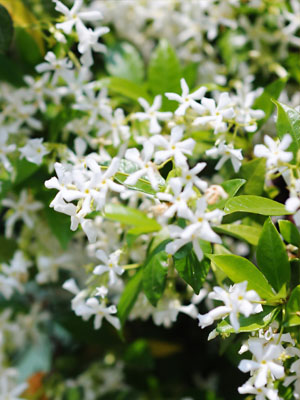Crop Rotation Group
Miscellaneous
|

|
Soil
Fertile, well-drained soil enriched with plenty of compost.
|
Position
Partial shade. Star jasmine is often grown near structures that provide some shade. It can be grown as a ground cover in partial shade.
|
Frost tolerant
Cold hardiness is limited to about 10°F (-12°C). In colder regions, plants can be grown in containers that are kept indoors through winter.
|
Feeding
In early spring as new growth emerges, mulch over the root zones of the plants with rich compost or rotted manure. Feed container-grown plants monthly with liquid fertilizer from spring to early autumn.
|
Companions
-
|
Spacing
Single Plants: 6' 6" (2.00m) each way (minimum)
Rows: 6' 6" (2.00m) with 6' 6" (2.00m) row gap (minimum)
|
Sow and Plant
Set out container-grown plants from spring to early summer. Enrich the planting hole with plenty of compost, and set the plant at the same depth it grew in its container. Newly planted vines establish quickly when given ample water. The best way to propagate star jasmine is to root stem cuttings taken in summer, after the plants finish blooming. Compared to other plants, star jasmine is a willing rooter, and will strike new roots in plain water. Allow 6 feet (2 m) between plants when multiple star jasmine plants are planted on a fence or wall. Most star jasmine vines are grown as single specimens trained up a post or trellis. With proper support, the woody twining plants can grow to 20 feet (6 m) tall. In containers plant one star jasmine per 14-inch (35 cm) wide pot. Increase pot size each spring to accommodate the plant’s growing root system.
Our Garden Planning Tool can produce a personalized calendar of when to sow, plant and harvest for your area.
|
Notes
Valued for its evergreen foliage and fragrant spring flowers, star jasmine is a low-care vine for growing as a green wall in partial shade. In areas where it is not hardy, grow the vine in a large container that can be brought into a cool outbuilding, basement or greenhouse in winter. Very small specimens can be kept as houseplants. Prune plants to shape them in summer, after the flowers fade. Avoid winter pruning, which removes latent flower buds.
|
Harvesting
Enjoy the fragrant blossoms in spring. Despite having short stems, star jasmine flowers with foliage can be included in small flower arrangements. Be careful when handling fresh cut star jasmine, because the sticky sap can cause skin irritation in some people.
|
Troubleshooting
Star jasmine has few pest problems, though it can scorch easily when grown in full sun. Check plants overwintering indoors for aphids and other hitchhikers.
|